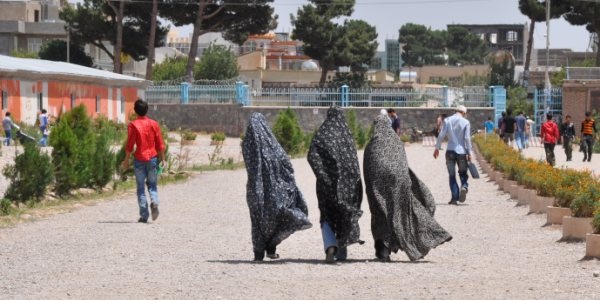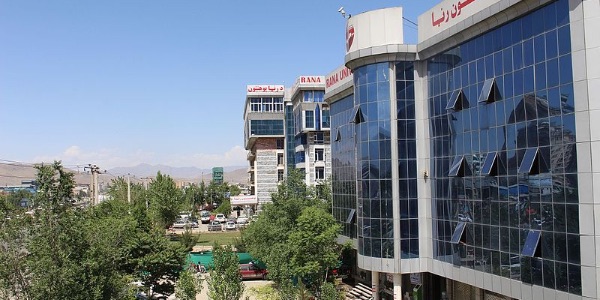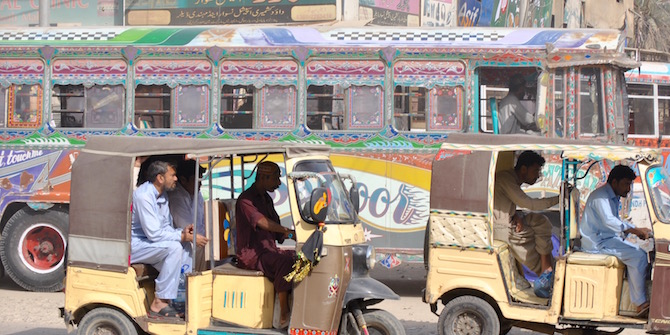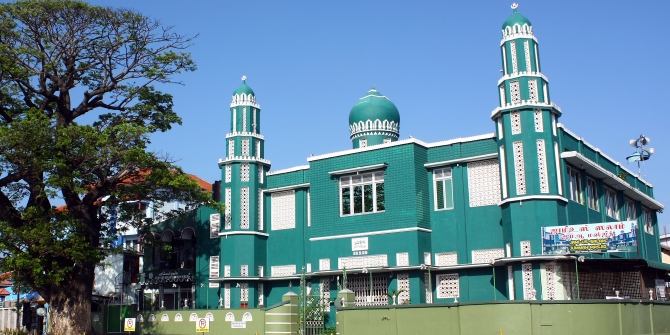If educated citizens are the key determinant of a nation’s development, then how can higher education in Afghanistan be improved? Sayed Nasrat and Tamim Karimi explore the challenges and potential solutions for quality higher education delivery in Afghanistan.
“No country can really develop until its citizens are educated.” – Nelson Mandela
It has been widely acknowledged that no country can alleviate poverty, achieve sustainable economic development and produce skilled human resources without substantial investment in human capital. Education is the main tool for investment in human capital development. Moreover, it makes individuals more responsible for contributing in the development of any economic sector in a country.
Undoubtedly, higher education increases people’s skills and knowledge, which in turn raises innovation, productivity, creativity, and fuels entrepreneurship and technological developments. Educated citizens can be the key determinant of a nation’s development which builds the economy and contributes in poverty reduction. In general, quality education and economic performance are likely to be related to each other: if one is improved, the other is also improved, vice versa. Therefore, this article attempts to highlight recent improvements and current challenges in the higher education sector of Afghanistan and discusses its role in the economic development of the country.
Higher education institutions in Afghanistan
Since the Taliban regime was ousted in 2001, there has been a significant improvements in different sectors, especially in the services sector in Afghanistan. However, around 39 percent of its population are living in poverty, and about 40 percent are not gainfully employed. Nevertheless, there has been a substantial increase in the number of universities and higher education institutes, and students’ admissions. For example, the number of public universities and institutes increased from 19 in 2002-2003 to 36 today and the private universities, and higher education institutes increased from close to 0 to more than 100 at present. Across the country, admissions have risen from about 7,900 students in 2001 to 300,000 students in 2017 at public and private universities and higher education institutes. Notably, for the first time in the country’s history, Ph.D programs have been recently launched by Kabul and Nangarhar Universities – public universities.

Female students on campus in Herat University. Image credit: Foreign and Commonwealth Office, Flickr
The challenges
Despite the cited quantitative immense growth during the past over one decade, Afghanistan suffers from severe challenges on the road to organize its higher education system for the best possible economic development. Lack of access to higher education at the universities and higher education institutes for most of the youths is one of the main challenges in Afghanistan.
Since the demand for higher education is growing due to the expansion of primary and secondary education and the economic benefits of higher education, public universities and higher education institutes do not have enough resources to absorb everyone. To solve this problem, every year thousands of successful university entry test, known as Kankor, applicants are enrolled at private universities and higher education institutes by the Ministry of Higher Education (MoHE) with tuition-free or discount. In 2017, of 169,000 successful Kankor applicants, a total of 55,266 were enrolled at private universities and higher education institutes, which is a higher number than the previous years. According to the World Bank, compared to many other low-income countries, the private sector in Afghanistan has absorbed a relatively large number of students.
It seems to be common when high school graduates who do not find a way at first attempt to pass Kankor exam, either try again or go to the private universities and higher education institutes. Since tuitions fees are high at private universities and higher education institutes, most of the students cannot afford to pay them due to their low economy situation. In addition to this, the quality of the programs and the legitimacy of the degrees offered by most of the private universities and higher education institutes are a great concern for higher education practitioners and the MoHE.
Unfortunately, Afghanistan does not only have “ghost soldiers” and “ghost schools” but also ghost university students and graduates. In an interview the head of private universities department at MoHE – Mohammad Amir Kamawal did not refute the issue of ghost students and graduates. To solve this problem, Kamawal added that the MoHE does not issue degrees to the students of the private universities and higher education institutes until they separate the real graduates and students from the ghost ones.
According to Kamawal, the private universities and higher education institutes in terms of quality are categorized as: good, satisfactory and poor. This means none of the over 100 private universities and higher education institutes is categorized as excellent. Surprisingly, no public and private universities or higher education institutes in Afghanistan are in the list of regional and international university rankings. Moreover, almost none of them have academic peer reviewed/refereed journals to impart lecturers’ knowledge and provide students with up to date material and knowledge. This might be due to several reasons but two of the main reasons could be the lack of academic research among the lecturers/professors of the public and private universities and the institutes, and a lack of updated teaching materials.

Rana University building, Afghanistan. Image credit: CC BY-SA 4.0
Osman Babory, the former Deputy Minister of Higher Education for Academic Affairs admitted: “there are still faculty members at Kabul University, the largest and most ‘developed’ of all universities in the country, who teach with lecture notes they compiled decades ago, copied and copied again until barely legible anymore.” Top lecturers can be top researchers, but without research, lecturers cannot better compile, provide and explain lecture materials to the students. These all refer to the lack of qualified faculty members, especially at public universities. For example, figures show that 57 percent of the lecturers hold Bachelor degrees, 38 percent have Masters, and only five per cent hold PhDs.
Lack of modernized curriculum, medium of instruction rather than English, and lack of budget are also among the severe challenges, largely at the public universities. For instance, the staff at Kabul University said “they do not have “a single Afghani for its central library,” neither do faculties have money to stock their own, smaller libraries, and the same applies to provincial universities’ libraries.”
Despite some improvements in the curriculum in the last few years, especially at the public universities, reformed curriculum is not implemented at some faculties because lecturers stick to the old course materials. On the other hand, one of the problems with the private universities and higher education institutes is that they lack a unified curriculum.
Solutions
Certainly, these challenges have affected the quality of higher education. Undeniably, low quality of higher education makes graduates less productive and innovative in the labor market, which in turn has a negative impact on economic development of Afghanistan. The solution to these challenges is difficult but possible.
Together the Afghan government, especially the MoHE in collaboration with the universities, higher education institutes, and donors (e.g. World Bank, USAID) should address the cited challenges because the development of Afghan societies and economies is inter-linked with the development of (higher) education. To do so, there is great need for:
- Investment in higher education: The Government of Afghanistan, the donors, and the private sector should increase their investment, financial grants towards the capital costs in the higher education sector. Modern study campuses, dormitories, facilities, and equipment should be made to absorb more students. Libraries need to be modernized, and the skills and capacities of faculty members should be further improved.
- The teaching profession: The MoHE should monitor and evaluate the teaching profession of both public and private universities and higher education institutes. The teachers or lecturers should be selected based on merit and experience with holding at least master’s degree.
- English as a medium of instruction: essential for the students in most of the faculties (e.g. medical, economics, engineering, economics, computer science, etc). This could make graduates more competitive and productive in the labor market. To make this happen, English level of the school students should be improved.
- Research and development: Universities should built-up a research culture and focus on creating an entrepreneurial culture among their graduates. They should produce job creators rather than producing job seekers. To do so, universities should build linkages with the productive/business sector. The MoHE should provide research grants for talented students.
- Curriculum modernization: The curriculum of universities and higher education institutes should correlate with the economic situations of Afghanistan and the job market demands of the 21st century rather than teaching decades old materials to the students. Since rural poverty, internal displacement, refugees, corruption, and aid effectiveness are some of the major issues in Afghanistan it would be beneficial if these courses are incorporated in the universities and higher education institutes curriculum.
- Collaboration/Networking: Besides collaboration and networking with the business sector, the universities and higher education institutes in Afghanistan should establish linkages with the prestigious universities across the world, national, regional and international organisations for internship opportunities. This will help students to develop their thinking, create new knowledge, and improve creativity
Cover image: Mohammad Mandozai, dean of law, shows U.S. soldiers and civilians assigned to Provincial Reconstruction Team Khost the variety of books available in the law library at Sheik Zayed University. Photo credit: US Army, Public domain.
This article gives the views of the authors, and not the position of the South Asia @ LSE blog, nor of the London School of Economics. Please read our comments policy before posting.
About the authors
 Sayed Nasrat is a former researcher at the Ministry of Rural Rehabilitation and Development of Afghanistan, and Integrity Watch Afghanistan. He studied his Masters degree in International Cooperation Policy (Development Economics Division) at Ritsumeikan Asia Pacific University, Japan. His research interests are in development economics, foreign aid, rural development, poverty reduction and anti-corruption. He can be reached at sayed.nasrat2@gmail.com.
Sayed Nasrat is a former researcher at the Ministry of Rural Rehabilitation and Development of Afghanistan, and Integrity Watch Afghanistan. He studied his Masters degree in International Cooperation Policy (Development Economics Division) at Ritsumeikan Asia Pacific University, Japan. His research interests are in development economics, foreign aid, rural development, poverty reduction and anti-corruption. He can be reached at sayed.nasrat2@gmail.com.
 Tamim Karimi is an independent researcher and currently works as a Macro-Fiscal Analyst in the Marco Fiscal Performance Directorate of the Ministry of Finance in Afghanistan. He holds a Masters degree in International Cooperation Policy (Development Economics Division) from Ritsumeikan Asia Pacific University, Japan. Mr. Karimi’s main research interests are: development and macro-economic, poverty reduction, rural development. He can be reached at tamim_afghan4@hotmail.com
Tamim Karimi is an independent researcher and currently works as a Macro-Fiscal Analyst in the Marco Fiscal Performance Directorate of the Ministry of Finance in Afghanistan. He holds a Masters degree in International Cooperation Policy (Development Economics Division) from Ritsumeikan Asia Pacific University, Japan. Mr. Karimi’s main research interests are: development and macro-economic, poverty reduction, rural development. He can be reached at tamim_afghan4@hotmail.com








I hope this article reach to the directors of the universities too. I really feel sad about the education system in the country. The government and international community must work together on improving the quality of education system otherwise the increase in the number of universities will not benefit Afghanistan. With low quality of education the graduates will be a kind of burden over government.
The authors have highlighted importance of the higher education in Afghanistan and emphasized that any country can achieve growth with quality education. Great piece of information this article is.